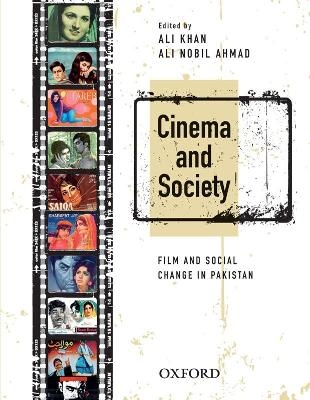
Cinema and Society
OUP Pakistan (Verlag)
978-0-19-940222-9 (ISBN)
The book presents a rich collection of critical essays, ethnographic writings, memoirs, and reflections, portraying a well-rounded picture of cinema culture and historical change in Pakistan. The multiplicity of voices and approaches enhances the appeal of this collection, which is the first ever to delineate the diversity in the cinematic and extra-cinematic traditions of Pakistan, as well as in the histories of production, exhibition, and reception. The work also highlights aesthetic and affective politics in relation to nationalism; Islamization in policy and practice; the biopolitics of morality, ethnicity, gender, and sexuality; and the phenomenology of film exhibition and urban formation. The book incorporates rarely seen nostalgia items, such as pictures of studio shootings, as well as of film actors, film scenes, posters, and lobby cards.
Ali Khan is Associate Professor of Anthropology and Department Chair at the Department of Humanities and Social Sciences at LUMS. His research interests vary from labour issues, particularly child and bonded labour to popular culture in Pakistan, focusing particularly on cinema and sports. He has previously worked in Washington and in Islamabad for the World Bank's South Asia Region and with the International Labour Organization primarily on projects related to child and bonded labour. Ali Khan's book Representing Children: Power, Policy and the Discourse on Child Labour in the Football Manufacturing Industry of Pakistan was published in 2007 by Oxford University Press. He is also the General Editor for a series of books on Sociology and Anthropology in Pakistan. Ali Nobil Ahmad is a Researcher at the Zentrum Moderner Orient, Berlin, and Assistant Professor, Department of Humanities and Social Sciences, Lahore University of Management Sciences (LUMS), where he teaches and designs courses in Modern History, Historiography, and World History. He was formerly a full-time Research Officer on the Leverhulme Project on Migration and Citizenship, undertaken by the Department of Geography at the University College, London, where he worked full-time on a global study on human smuggling and trafficking. He is also on the editorial board of an art and cultural studies journal titled, Third Text, and regularly contributes to various academic journals.
Foreword
Preface and Acknowledgements: Ali Nobil Ahmad And Ali Khan
Introduction
Chapter 1 Pakistani Cinema - Mushtaq Gazdar
Chapter 2 The Cinema In Pakistan [1969] - Alamgir Kabir
Chapter 3 Modernity And Vernacular Cinema - Iftikhar Dadi
Chapter 4 Cinema And The City - Kamran Asdar Ali
Chapter 5 From Zinda Laash To Zibahkhana: Horror And Violence In
Chapter 6 Nina The Inscrutable Housewife - Sadaat Hassan Manto
Chapter 7 Art And Life In Indian Cinema: The Films Of Guru Dutt
Section B: Transitions
Chapter 8 The Foot-Worshippers Guide To Watching Maula Jatt - Musharraf Ali Farooqi
Chapter 9 Pashto Horror Film In Pakistan - Milan Hulsing
Chapter 10 Reflections Of Change In The Pakistani Film Industry - Ali Khan Film Posters
Chapter 11 Punctuating Gendered Values: Exploring The Phenomena Of Slaps In Commercial Pakistani Films - Sadaf Ahmad
Chapter 12 Language And Ideology In Pakistani Cinema - Tariq Rahman
Chapter 13 Goonda Raj: The Untold Story Of Punjabi Cinema - Hashim Bin Rashid And Sher Khan
Chapter 14 Fascism And Real Estate: An Inquiry Into The Strange Death Of Traditional Cinema Halls - Ali Nobil Ahmad
Chapter 15 New Cinema From Pakistan: Film, Technology And Media In Transition - Ali Nobil Ahmad
| Erscheinungsdatum | 26.05.2016 |
|---|---|
| Sprache | englisch |
| Maße | 218 x 282 mm |
| Gewicht | 1382 g |
| Themenwelt | Kunst / Musik / Theater ► Film / TV |
| Geschichte ► Teilgebiete der Geschichte ► Kulturgeschichte | |
| Geschichte ► Teilgebiete der Geschichte ► Sozialgeschichte | |
| Sozialwissenschaften ► Soziologie ► Allgemeines / Lexika | |
| ISBN-10 | 0-19-940222-1 / 0199402221 |
| ISBN-13 | 978-0-19-940222-9 / 9780199402229 |
| Zustand | Neuware |
| Informationen gemäß Produktsicherheitsverordnung (GPSR) | |
| Haben Sie eine Frage zum Produkt? |
aus dem Bereich


